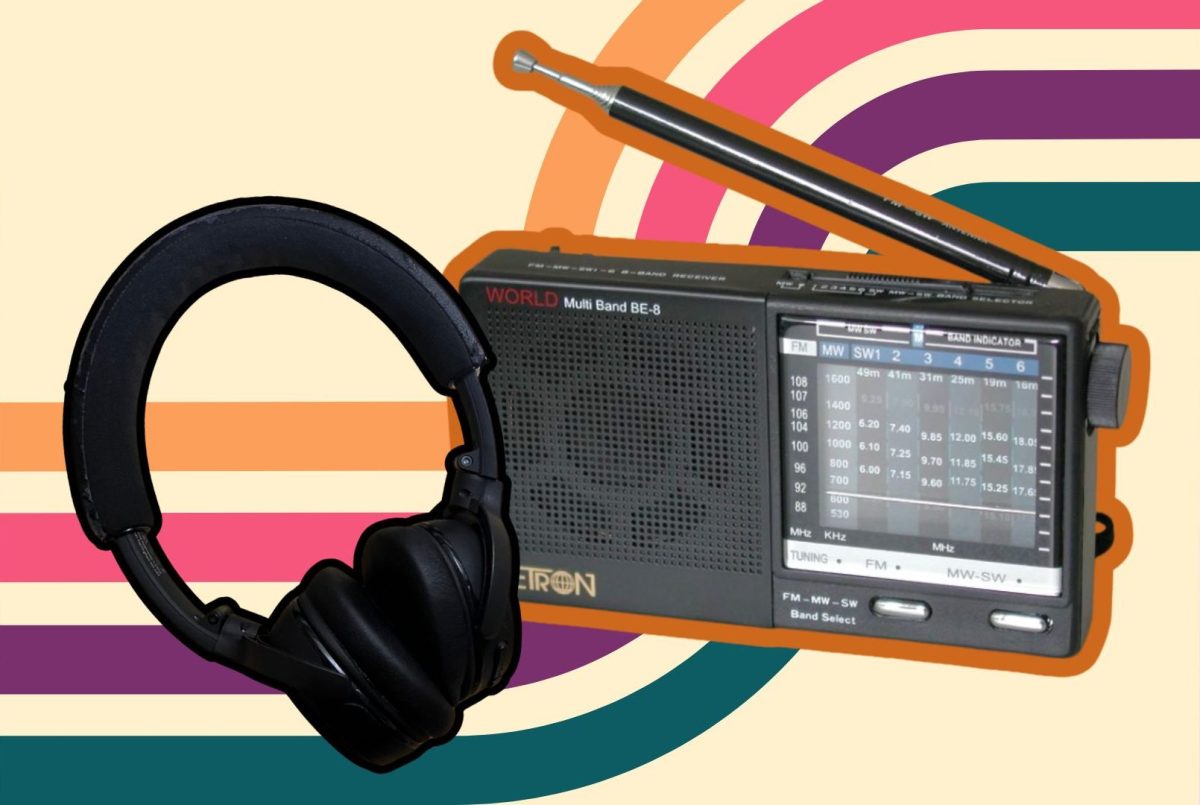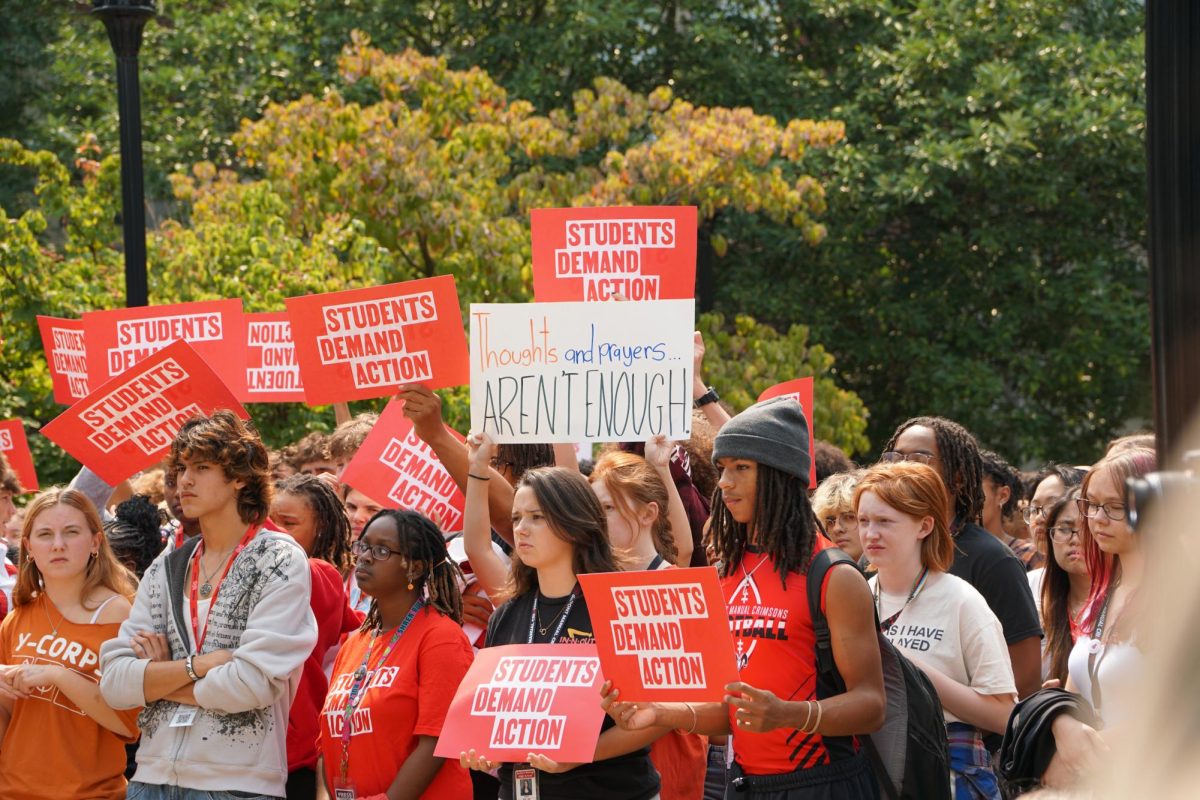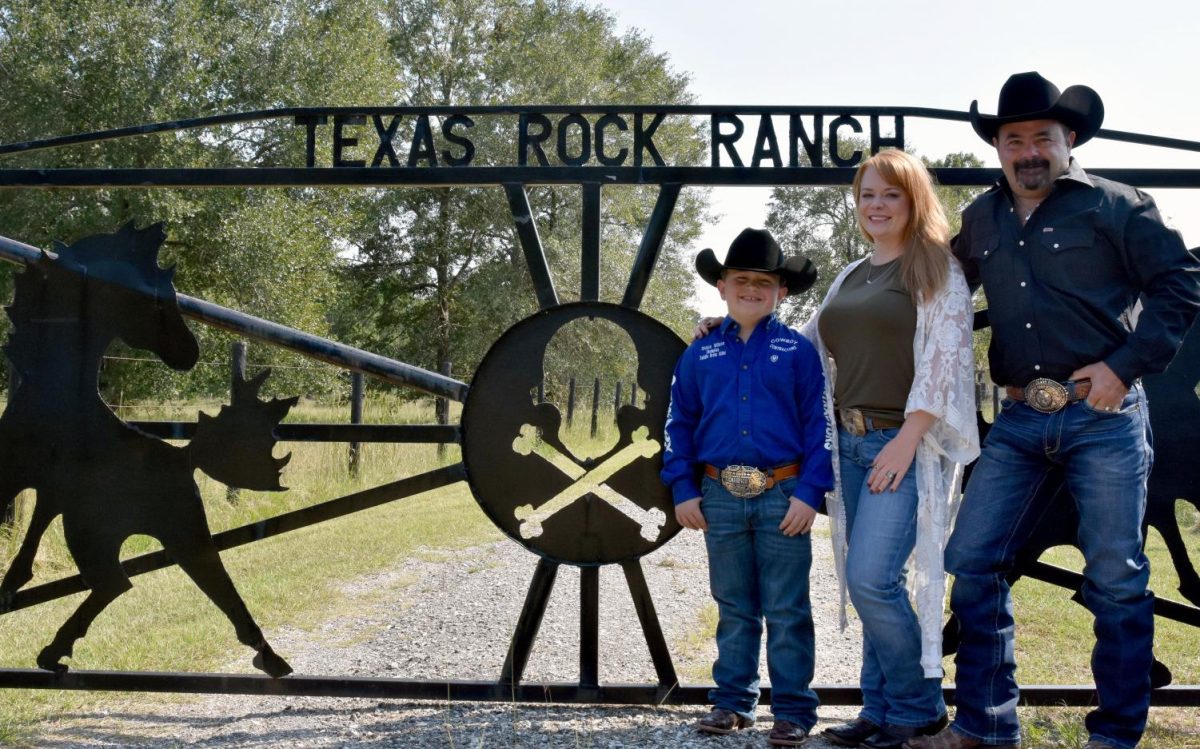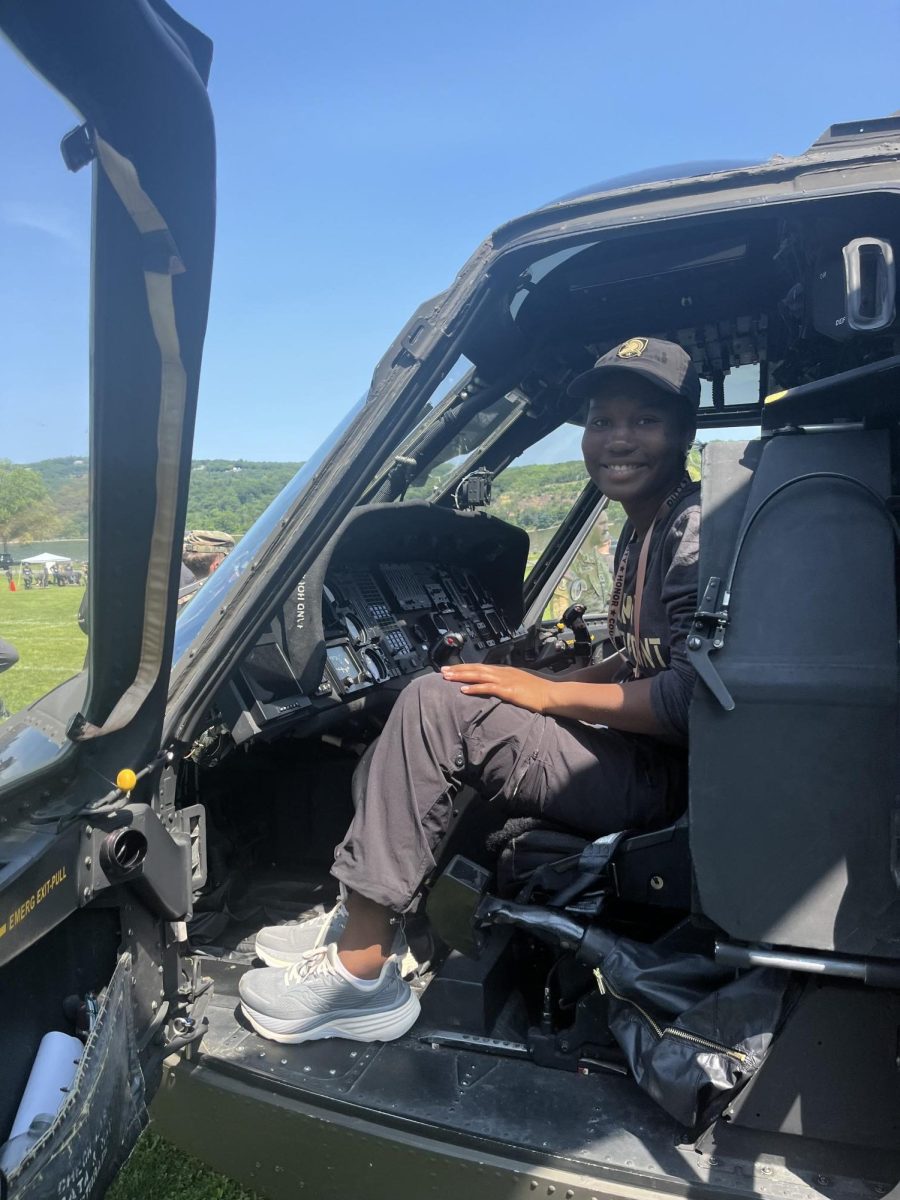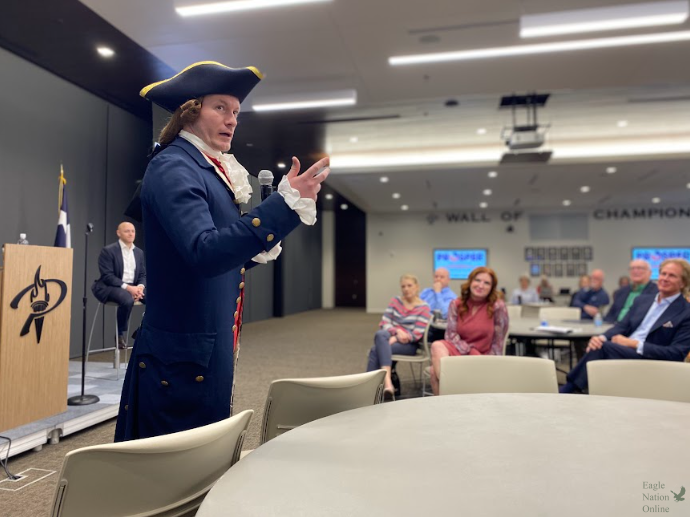It’s a real – but unusual – profession.
It’s a full-time job – but only two men in the world are paid to do it.
It’s Kurt Smith’s calling.
Smith is paid full-time to research and portray Thomas Jefferson, the third president of the United States. Smith works at Colonial Williamsburg, an American history museum in Williamsburg, Virginia, and visited Prosper on Feb. 15 to record an episode of “The Strategerist” podcast with representatives from the George W. Bush Presidential Center and Prosper students at Walnut Grove High School, speak to an AP Government class at Prosper High School and discuss the concept of freedom in America with the local community at a Prosper Exchange meeting at the Children’s Health Stadium Community Center. The next Prosper Exchange meeting will occur today at Boyer Elementary School at 6 p.m. and be over the role of media.
“When you go to Colonial Williamsburg, you will be walking into the best movie set in the entire world because we are accurate down to the nail,” Smith said. “Every trade that’s needed in the 18th century is represented in the 21st century at Williamsburg. You might come across some strange folks whose names you might have heard before, like Thomas Jefferson, George Washington, James Madison and even names you might not know but you should, like George Mason or George Wythe.”
Smith originally wanted to major in biology.
“I took some AP history courses in high school, but I was a science guy,” Smith said. “In my senior year, on a full-ride biology scholarship, looking at getting a diploma, I switched my major to theatre. I ended up getting an undergraduate degree in theatre and a master’s degree in theatre and worked in New York City for several years. I taught college theatre for three years, acting one, acting two, intro to theater, those types of classes. And then this job came across my desk.”
Smith received an email from an old friend who worked at Colonial Williamsburg, which he had never heard of, informing him that the museum was taking auditions for the role of Thomas Jefferson.
“I think when I when I first received that email, I could probably tell you three or four things about Thomas Jefferson,” Smith said. “Clearly, I applied. I was the very last auditioner, drove down from New York City, and, at that point, I had read three books on Thomas Jefferson to prepare me. They said it was going to be a five-part audition an hour in length, and the last part was going to be a 15 to 20 minute Q&A in character. You can’t prepare for that. Fast forward through a couple of steps, I get the phone call that if I’ll have them, they’ll have me. And so began one of the greatest journeys of my entire life.”
Before taking the role of Jefferson, Smith didn’t have much of an interest in history.
“I didn’t abhor history,” Smith said. “It just was not on the full plate of things you have as options to study it. I was interested in other things. Now, I love it. I love it because history is a manual for mankind to be better. How cool is it that you can predict the future, if you know the past?”
Smith’s main goal in being Jefferson is getting the history right.
“There was just a massive study done about trust in America right now,” Smith said. “There’s not a great deal of it. The number one place where Americans have trust is museums. If I don’t do my job correctly, then I erode the last bastion of American trust we have.”
Smith said challenges come with becoming Jefferson.
“People sometimes come to Jefferson with an axe to grind,” Smith said. “They have a very strong opinion of Jefferson, and sometimes it’s around slavery. The questions are not reasoned, and what they’re asking is pretty hot and accusatory. So, my job is not just to answer the question, but cool the temperature of the room. If you deny the fire oxygen, then it will go out, and they walk away, not having received what they really wanted, which is an argument.”
Smith agrees with many of Jefferson’s ideals, especially those that have to do with freedom.
“He was one of the most progressive revolutionaries,” Smith said. “He pushed for women to have education, free education. He pushed for the abolishing of slavery and he pushed for the equalization of religion. These are all very progressive stances at his time. That type of progressive stance and leaning sits well with me, and we agree a great deal on natural rights of mankind and that government perhaps is best when it steps away a bit and just allows man to be man, so long as you do not infringe on your neighbor’s rights.”
However, Smith also disagrees with ideals Jefferson had, such as his opinions on gender roles.
“He’s a little bit patriarchal, for my tastes,” Smith said. “Not to absolve him of all wrongdoing, but that was very standard in his time. It was expected that if you were a male of his status, his class, it was expected that you would maintain the public sphere of your family. You’re the one who’s in public office. You’re the one who runs the public side, and the ‘fairer sex,’ as Jefferson would say, their job is the private sphere. We might look at that today and say, women don’t belong in the kitchen.”
Smith has performed for organizations like Congress and the Supreme Court.
“At Colonial Williamsburg, we have a very good reputation, a strong national and international reputation, and that includes current state houses and federal positions as well.” Smith said. “Every freshman U.S. Congress class comes to Colonial Williamsburg, and we do sort of a week-long masterclass. We do the same with the U.S. Supreme Court. We have the opportunity to meet with them somewhat frequently, and we always have at least one U.S. Supreme Court Justice on our board.”
Smith began his Prosper appearances as Jefferson with a podcast with Prosper and Walnut Grove students, including senior Juliana Cruz.
“I believe that everyone should be able to experience what it’s like to speak and watch someone fulfill history in such an iconic way,” Cruz said. “It was mind-opening. I learned qualifications of what it’s like representing someone so important and how it can impact others, but yourself as well.”
After that, he visited Prosper High School to speak to students in Scott Nichols’ AP Government class about American liberty.
“I think it’s important to talk about these ideals and how Founding Fathers used to think in their time because I think that a lot of people have lost sight of it,” junior Mara Gonzalez Moral, audience member and president of Prosper Junior State of America, said. “I think a lot of people nowadays have this idea of what they thought the Founding Fathers wanted, when, in reality, if we look back, we see that it’s a little different from what we originally thought. I think it’s really important to remember that, you know, the Founding Fathers created this country based on compromise and change, not based on solidity and always doing things according to one person or one ideal or one way of thinking.”
Smith ended his day as Jefferson by discussing the topic of freedom with the community at the Prosper Exchange.
“The Prosper Exchange is something that the people of Prosper launched last year officially, and its whole purpose is to provide an in-person-only public forum to have honest dialogue and civil discourse around our country’s most challenging issues,” Jason Galui, organizer of the Prosper Exchange, said. “We thought in 2024, as we have entered a historic and, dare I say, a contentious presidential election season, what better way to start it than with a Founding Father such as Mr. Thomas Jefferson with one question: what is freedom?”
Smith finds that Jefferson “speaks” to him when reading current news.
“There are always two men in my head at any one moment,” Smith said. “Jefferson has taught me a great deal. I think he has provided me a greater understanding of American policy of constitutional understanding of what it means to be a citizen. I am a stronger citizen because of Thomas Jefferson.”
Smith wants to make those around him stronger citizens through Jefferson’s teachings.
“On the best of days and the brightest of days, when I am on my A-game, hopefully, I can bottle some of that lightning that was Jefferson, and send it out to whoever is in the audience,” Smith said. “My goal is just to get a few wheels to turn. If you walk away and you’re questioning things in a little bit of a different way, if you’re at least cogitating upon the fact that other people think differently than you, that’s good. If you go further, if there’s something deeper, fantastic. Maybe I can help you become a better citizen because of not just me, but because of Thomas Jefferson. I’m just a vessel to deliver that lightning.”
This story was originally published on Eagle Nation Online on May 2, 2024.

